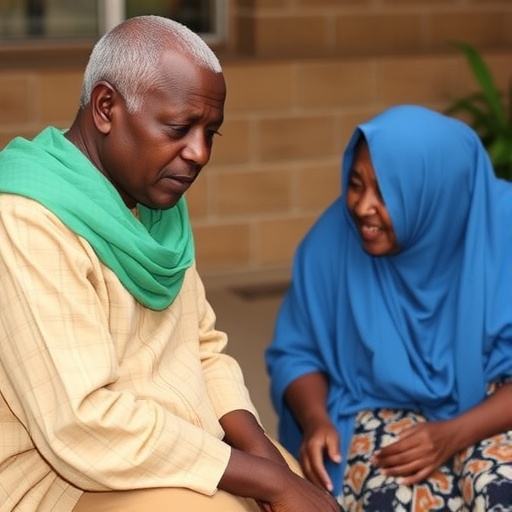In the bustling city of Ibadan, Nigeria, a profound exploration into the lives of older adults has emerged, shedding light on how various sociodemographic and clinical factors intricately impact their health outcomes and overall quality of life. This research, authored by T. Olaoluwa and M.S. Ajayi, seeks to unravel the complexities tied to illness progression among Nigeria’s aging population, a demographic that is often overlooked in health studies. The findings present a mosaic of information vital not only for local health initiatives but also for global understanding of geriatric care.
As the global population ages, the significance of understanding older adults’ experiences cannot be overstated. The research conducted in Ibadan provides crucial insight into the interplay between sociodemographic factors—such as age, gender, socioeconomic status, and education—and the clinical parameters that define health trajectories for this demographic. This encompasses the range of chronic diseases prevalent in the Nigerian context, alongside psychosocial elements that contribute to the well-being of older individuals.
In examining illness progression, the researchers collected extensive data that illustrate how underlying conditions influence the quality of life in these older adults. Chronic diseases, including hypertension and diabetes, were prevalent in the population studied, significantly correlating with the participants’ reported levels of distress and functional limitations. This connection highlights the urgent need for targeted health interventions designed not only to treat these chronic conditions but also to enhance the overall health resilience of aging citizens.
Equally important are the sociodemographic factors that exert influence over health outcomes. For instance, the research indicates a gender disparity wherein women tend to report lower quality of life metrics compared to their male counterparts. This disparity could be linked to a myriad of factors, including the traditionally greater burden of caregiving that women often shoulder, which may exacerbate health challenges. Understanding these gender-based nuances is crucial for public health strategists seeking to develop gender-sensitive health programs.
Moreover, socioeconomic status emerged as a pivotal element in this study. Older adults hailing from lower-income backgrounds displayed a greater incidence of disease and a concomitant decline in quality of life. This relationship underscores the importance of socioeconomic factors as facilitators or barriers to accessing quality health care services. Without sufficient income, many individuals are unable to afford medications, regular check-ups, or even basic preventive care, therefore perpetuating a cycle of poor health outcomes.
In addition, the study highlighted the role of education in shaping health outcomes. Higher levels of educational attainment appeared to provide older adults with enhanced health literacy, allowing them to better navigate the healthcare system and advocate for their own health needs. This correlation illustrates the profound impact that education can have on fostering independence and self-management, particularly within an aging population increasingly reliant on complex healthcare services.
Another vital aspect of the research is its emphasis on the psychological and social dimensions of aging. Feelings of loneliness and social isolation were identified as significant detractors from the quality of life among older adults. This finding accentuates the need for community engagement strategies that foster social connectivity and emotional support, which are essential components of holistic care for the elderly. Programs aimed at increasing socialization opportunities could potentially mitigate the adverse effects of loneliness.
As the study reflects on the multifaceted nature of health in older adults, it becomes clear that a one-size-fits-all approach to geriatric care is insufficient. The nuances of individual experiences must be considered when developing health policies and interventions. Policymakers are thus encouraged to adopt a comprehensive view of geriatric health that includes not only the traditional medical model but also sociocultural perspectives that affect health behaviors and outcomes.
Furthermore, the implications of this research extend beyond the Nigerian context. As similar aging trends are observed globally, the insights gained from this study may resonate with policymakers in other countries facing the challenges of an aging populace. This research serves as a call to action for nations around the world to prioritize the needs of older adults and implement evidence-based strategies tailored to this demographic’s unique challenges.
The research findings have the potential to influence future public health strategies significantly. By highlighting the intersection of sociological and clinical factors, health officials can create targeted initiatives that address the larger social determinants of health impacting older adults. This approach could lead to improved health equity and ultimately enhance the quality of life for aging individuals, fostering a healthier society as a whole.
Ultimately, as the global landscape continues to shift toward an aging population, understanding the complexities surrounding geriatric health is paramount. The research conducted in Ibadan acts as a microcosm of larger global issues, encouraging a reevaluation of how societies perceive and engage with their older members. The narrative of aging, stigma, and health continues to evolve, and it is through thoughtful research and proactive policy-making that positive change can be realized.
In conclusion, the study by Olaoluwa and Ajayi presents a compelling narrative about the converging paths of sociodemographic factors and clinical health outcomes among the elderly in Nigeria. It serves not only as a source of valuable data but also as a poignant reminder of the responsibility that society holds in ensuring that every individual, regardless of age, is afforded dignity, care, and the opportunity to lead a fulfilling life. As we look ahead, it is imperative that we embrace a more inclusive perspective on health that honors the experiences and needs of older adults worldwide.
Subject of Research: Influence of sociodemographic and clinical factors on illness progression and quality of life among older adults in Ibadan, Nigeria.
Article Title: Influence of sociodemographic and clinical factors on illness progression and quality of life among older adults in Ibadan, Nigeria.
Article References:
T. Olaoluwa, O., Ajayi, M.S. Influence of sociodemographic and clinical factors on illness progression and quality of life among older adults in Ibadan, Nigeria.
BMC Geriatr 25, 791 (2025). https://doi.org/10.1186/s12877-025-06458-8
Image Credits: AI Generated
DOI: 10.1186/s12877-025-06458-8
Keywords: Geriatric health, sociodemographic factors, clinical outcomes, quality of life, aging, chronic diseases.




